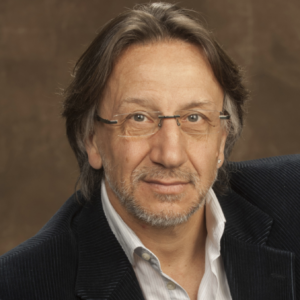Boldrin’s research focuses on the theory and application of Dynamic General Equilibrium models. He has written on economic growth, business cycles, asset pricing, the welfare system, innovation theory and technological progress, search theory, the labor market, intellectual property, fertility, and international trade.

Michele Boldrin
Joseph Gibson Hoyt Distinguished Professor in Arts & Sciences
Contact Information
- Phone: 314-935-5636
- Email: boldrin@artsci.wustl.edu
- Website: Website
Media Contact
In the media
A Wealth Tax Isn’t the Right Way to Pay for the Pandemic
Michele Boldrin, Joseph Gibson Hoyt Distinguished Professor in Arts & Sciences
Whither the patent system?
Michele Boldrin, Joseph Gibson Hoyt Distinguished Professor in Arts & Sciences; and David Levine, the John H. Biggs Distinguished Professor of Economics
Stories
Italy’s troubles may foreshadow what’s at stake for U.S., economist says
With Italian Prime Minister Silvio Berlusconi on the way out of power, Italian debt has risen to record levels with few solutions in sight. An economist at Washington University in St. Louis who was born and raised in Italy warns that the Italian troubles may foreshadow what’s at stake for the United States as well, no matter how much more reliable its public debt may appear today.
Proposed Italian austerity measures too little, too late, expert says
The Italian government on July 14 passed an austerity package designed to balance the budget by 2014 and protect Italy from a debt crisis. Will it work? Most likely not, says an economist at Washington University in St. Louis.
Bernanke fails to address key issues, WUSTL economist says
Despite all the “irrational exuberance” April 26 surrounding the first-ever news conference conducted by a Federal Reserve bank chair, the issues that Chairman Ben Bernanke chose to dance around were equally unsurprising as those he managed to address, says Michele Boldrin, PhD, the chair of the Department of Economics in Arts & Sciences at Washington University in St. Louis.
New Cook professorship will create great future economic thinkers
At a time when the American economy needs the best and the brightest economic minds, prominent banker and philanthropist Sam B. Cook has given Washington University a critical resource to help develop the next generation of economic leaders with a gift of $1.5 million to establish a professorship in the Department of Economics in Arts & Sciences.
Economists say copyright and patent laws are killing innovation; hurting economy
Patent and copyright law are stifling innovation and threatening the global economy according to two economists at Washington University in St. Louis in a new book, Against Intellectual Monopoly. Professors Michele Boldrin and David K. Levine call for abolishing the current patent and copyright system in order to unleash innovations necessary to reverse the current recession and rescue the economy. The professors discuss their stand against intellectual property protections in a video and news release linked here.
Economists object to Obama stimulus plan
Boldrin
In a full-page ad published in major newspapers Jan. 29, more than 200 economists — including two from Washington University in St. Louis — politely reject President Obama’s stimulus package calling for increased government action to jumpstart the economy.
A solution to social security and education funding: it’s all part of the cycle of life
Bill Michalski/WUSTL PublicationsA loan finances a young person’s education. Twenty years later, that child is working, contributing to the economy and paying off their loan. As they repay, the capitalized value of the loan pays back their debt to the previous generation in the form of a pension.Funding social security and education are often thought of as separate issues. But the two issues should be linked, says economist Michele Boldrin, the Joseph Gibson Hoyt Distinguished Professor in Arts & Sciences at Washington University in St. Louis. In the same way that younger generations take care of their elders as a kind of “return” on their parent’s investment, so too can the U.S. invest in the educational needs of its children and have the accumulated debt be paid off to retirees when it comes due.
